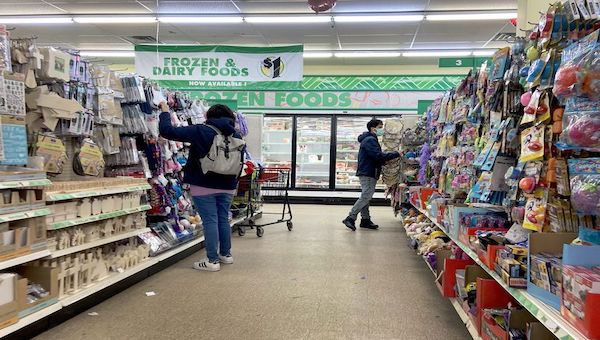 Report shows that shoppers are getting a bad deal with those low prices
Report shows that shoppers are getting a bad deal with those low prices
DOLLAR STORES ARE FULL OF TOXIC PRODUCTS
BY: KATHERINE MARTINKO & FACT CHECK: HALEY MASTSITE: TREEHUGGER
TRENDING
Activism
Belief
Big Pharma
Conspiracy
Cult
Culture
Economy
Education
Entertainment
Environment
Global
Government
Health
Hi Tech
Politics
Prophecy
Science
Social Climate
Universe
War
Walk into a dollar store and you can't help but notice the strong plastic smell that assaults your nose. These stores, which have become essential to many Americans in need of more affordable household goods in recent years, are jam-packed with cheap, imported items made to standards that are unfortunately questionable.
With this site being Treehugger, you may not be surprised to learn that we're not fans of dollar stores. Many of the products they sell are not built to last. The items are often shoddier replicas of pricier counterparts and they break easily, are hard or impossible to recycle, and end up in landfills far sooner than they should. It's a shopping model built on the cheap and temporary satisfaction of needs—not the "buy less but buy better" approach that we strive for whenever possible.
But the problems go deeper than that. One study has shown that when discount retailers open in a community, it can lower employment rates and reduce access to healthy, fresh produce and other groceries. Dollar stores may appear to be a solution to rising household costs, but there is some evidence that they exacerbate the problem.
Now, researchers have uncovered yet another reason to worry about the effects that discount retailers have on communities, particularly those that are already struggling to make ends meet. What our noses already suspected has been confirmed in a new report from the Campaign for Healthier Solutions. "Toxic Chemicals in Dollar Store Products: 2022 Report" reveals that more than half of 226 products tested in both U.S. and Canadian discount retailers contain chemicals of concern. These are chemicals that present a "known or reasonably suspected risk to human health and/or the environment," such as lead, mercury, arsenic, and phthalates, among others.
Toxic
Toxic means "having to do with poison or something harmful to the body. Toxic substances usually cause unwanted side effects."
The Ecology Center Healthy Stuff Lab conducted the tests, subjecting products to various analytical techniques. Results showed that items such as child-themed wireless headphones contain lead solder, flame retardants, and phthalate plasticizers, which have been linked to higher rates of childhood cancer. Numerous products revealed polyvinyl chloride (PVC), a flexible plastic that can contain endocrine-disrupting chemicals. Food packaging and cooking pans tested positive for PFAS, the nonstick "forever" chemical that persists in the body and natural environment and can bioaccumulate over time. Bisphenol S was found in 100% of paper receipts from all retailers.
Overall, the dollar stores were found to be rife with chemicals that have concerning consequences for human health. For José Bravo, national coordinator for the Campaign for Healthier Solutions, this is inexcusable. He told the Guardian , "As a parent, I should be able to buy a product without expecting to poison my child."
In a conversation with Treehugger in 2021 about last year's dollar store report, Bravo pointed out that we must keep in mind the cumulative effect that exposure to these chemicals can have on our bodies. "We touch that receipt one time, but the workers touch that receipt maybe 400-500 times per day. So we want to limit exposures to workers. It's not just about consumers, it's about the environment as well."
Jeff Gearhart, research director for the Ecology Center Healthy Stuff Lab, agrees with Bravo that companies shouldn't be selling such toxic products. "There are known substitutes for these hormone-disrupting chemical hazards. The fact that they continue to be used in these low cost products that dollar stores sell is a real problem... Everybody should have access to healthier, lower-hazard products and it shouldn't depend on what you can afford."
When asked whether dollar stores are selling products made to an inferior standard than products sold by non-discount retailers, Gearhart told Treehugger over email this week, "Discount retailers may sell the same products as other retailers; however, some of the products tend to be surplus or overstock, damaged, or simply out of date/fashion products. The combination of these issues with a lack of government oversight and lack of comprehensive chemical policy by the discount product retailers creates a perfect storm that enables hazardous products end up on the shelves."
Solutions
What's a frugal shopper supposed to do? It's hardly realistic for cash-strapped households to spend more than they already are on food and other products. Gearhart suggested the following actions:
Add your voice to a petition that calls on 99 Cents Only to phase out harmful chemicals. "Help change retailer policy by talking to the companies. This is a systemic problem and it requires action by retailers to solve," he said.
Avoid Bisphenol chemicals, e.g. BPA, BPS, etc. You can do this by avoiding microwave popcorn, declining a receipt, and selecting fresh food over canned when you are able. Ask local discount stores to stock more fresh food options because only consumer pressure will lead them to change.
Avoid discount consumer electronics. "In addition to these products not being very durable, our study found they are much more likely to contain chemical hazards," Gearhart told Treehugger. Higher-quality electronics can often be found secondhand or refurbished—and the upfront investment is worth it if it's built to last and/or comes with a warranty.
Some good Treehugger advice might be to
avoid plastics
. Dollar stores sell glass containers that are a safer bet. These can also be more easily reused and last longer than plastic without degrading.
Click 3 Dots Below to View Complete Sidebar


